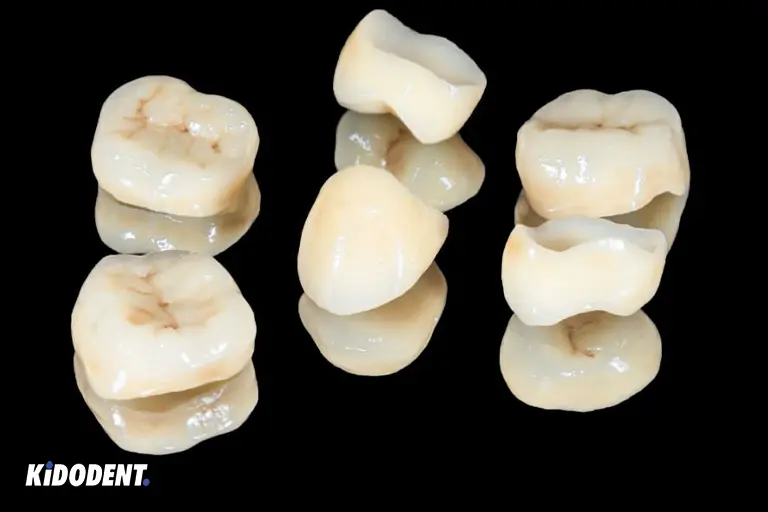Dentists recommend crowns to cap a tooth that is wearing down, broken, or very weakened. A dental crown improves your smile appearance while helping teeth regain its function. In more recent years, zirconia, which is a newer material in dentistry, has become a popular choice. One of the major benefits of zirconia crowns is their durability and strength. So, if your dentist has suggested zirconia or you just heard about it, we will break down the benefits and the possible drawbacks so that you will better understand a zirconia crown.
What is a zirconia crown?
Zirconia crowns are made of zirconium dioxide, a type of crystalline ceramic. If we make it more specific, zirconia material is based upon yttrium tetragonal zirconia polycrystals (Y-TZP). Yttrium oxide is blended with zirconium oxide which makes up the material known as zirconia.
Due to ceramic properties, zirconia offers a tooth-like natural coloring. However, zirconia is much stronger than other ceramics like porcelain. In fact, it is considered one of the strongest dental crown materials besides gold alloy.
Why zirconia?
Dental crowns are caps that are cemented on badly broken and damaged teeth either for cosmetic or functional purposes. They can help resolve many dental issues, including restoring seriously decayed or worn-down teeth as well as covering misshapen and discolored teeth. They also cap a dental implant and are used to hold a dental bridge in place.
When it comes to choosing the suitable crown material, there are different types of dental crowns you can get. For example, gold and other metals are widely used because of the greater strength they offer. They withstand chewing forces and don’t break, but the problem is they don’t look like natural teeth in color.
Zirconia, however, is both durable and tooth-colored. That brings with it the aesthetics of a ceramic and the long-term strength of metals.
What are the benefits of zirconia crowns?
Zirconia has combined strength and aesthetics into one material for dental restoration.
Here are the benefits of zirconia crowns:
Strength
Zirconia is the most durable ceramic which offers unique strength and durability. Unlike glass ceramics like porcelain, zirconia is highly resistant to cracking or chipping and withstand chewing forces.
This material is also more suitable for patients who may grind their teeth. If you are looking for a tough crown for back teeth, zirconia is an excellent option. The good thing about zirconia is that it is ceramic and therefore resembles natural teeth color. This makes it more popular than crowns made of metal in the back of the mouth.
Extreme longevity
The exceptional strength of zirconia provides a person with longer years of longevity. You can expect an incredible lifespan of up to 20 years with a crown made of zirconia.
The polycrystalline structure of zirconia gives it a super strong flexural strength of 900–1200 MPa. This makes zirconia many times stronger than any ceramic crown.
CEREC same-day procedure
Zirconia crowns can be processed using casting procedures in the dental lab. Or, it can be milled from a monolithic block using in-house milling machines, which is referred to as a CEREC crown. The process involves computer-aided design/manufacturing (CAD-CAM) technology to design and then place the crown as part of a same-day procedure.
This way, you can have your zirconia made and cemented in place in just a single visit. The process eliminates the need for a temporary crown and having to wait for the laboratory for weeks.
Biocompatible
Another advantage that makes dentists recommend zirconia is its biocompatibility. The material is less likely to trigger the body to produce an immunological response like inflammation or reaction. And it is safe to be in your mouth for many years.
In fact, zirconia is a great alternative if you can’t get a metal-supported option due to risks of allergic reactions to metal.
What are the disadvantages of zirconia crowns?
There can be minimal disadvantages when it comes to zirconia crowns. However, you may consider any issues for any dental work and zirconia is not an exception.
May cause friction on opposing teeth
Generally, ceramic materials, and that includes zirconia, are tougher and harder on teeth than metals. This causes potential wear on opposing teeth when you frequently grind the crown tooth on them or chew hard.
However, friction and damage to enamel can easily be prevented if you just be a little more careful. Regular check-ups will also help you avoid any harmful effects that could arise on both your crown tooth and the other teeth.
Rather difficult to match
As zirconia is a polycrystalline ceramic, it has an opaque appearance. This may give it a less natural look for front teeth when you compare it with more appealing options like lithium disilicate.
Zirconia vs Porcelain
Porcelain is one of the most aesthetic crowns out there, which turns it to be the preferable option for visible front teeth. However, porcelain is a less strong type of material. It is more prone to chipping and fragile and is not recommended for back teeth.
On the other hand, zirconia’s opaque color and appearance may not offer a very attractive look you may want for a front tooth. This is why your dentist may offer porcelain instead.
Zirconia vs E-max
Like zirconia, E-max crowns are a newer material in dentistry. E-max, which is also called lithium disilicate, is a highly aesthetic and translucent ceramic. Although it is far stronger than porcelain material, E-max is not as strong as zirconia. So, zirconia still wins as the top durable crown choice.
However, the opacity of zirconia will not make it a perfect aesthetic option for a tooth on the front. Lithium disilicate provides a great natural appearance. It is the best esthetic choice along with porcelain if you want a beautiful crown for your front teeth.
